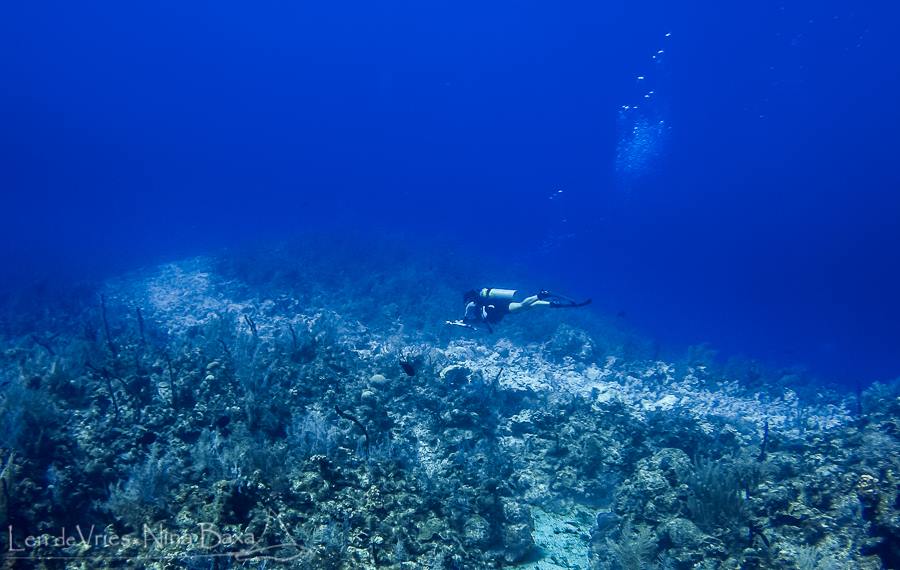News
Ocean Frontier’s Lois Hatcher Helping Lead the Way In Cayman Volunteer Reef Restoration Project
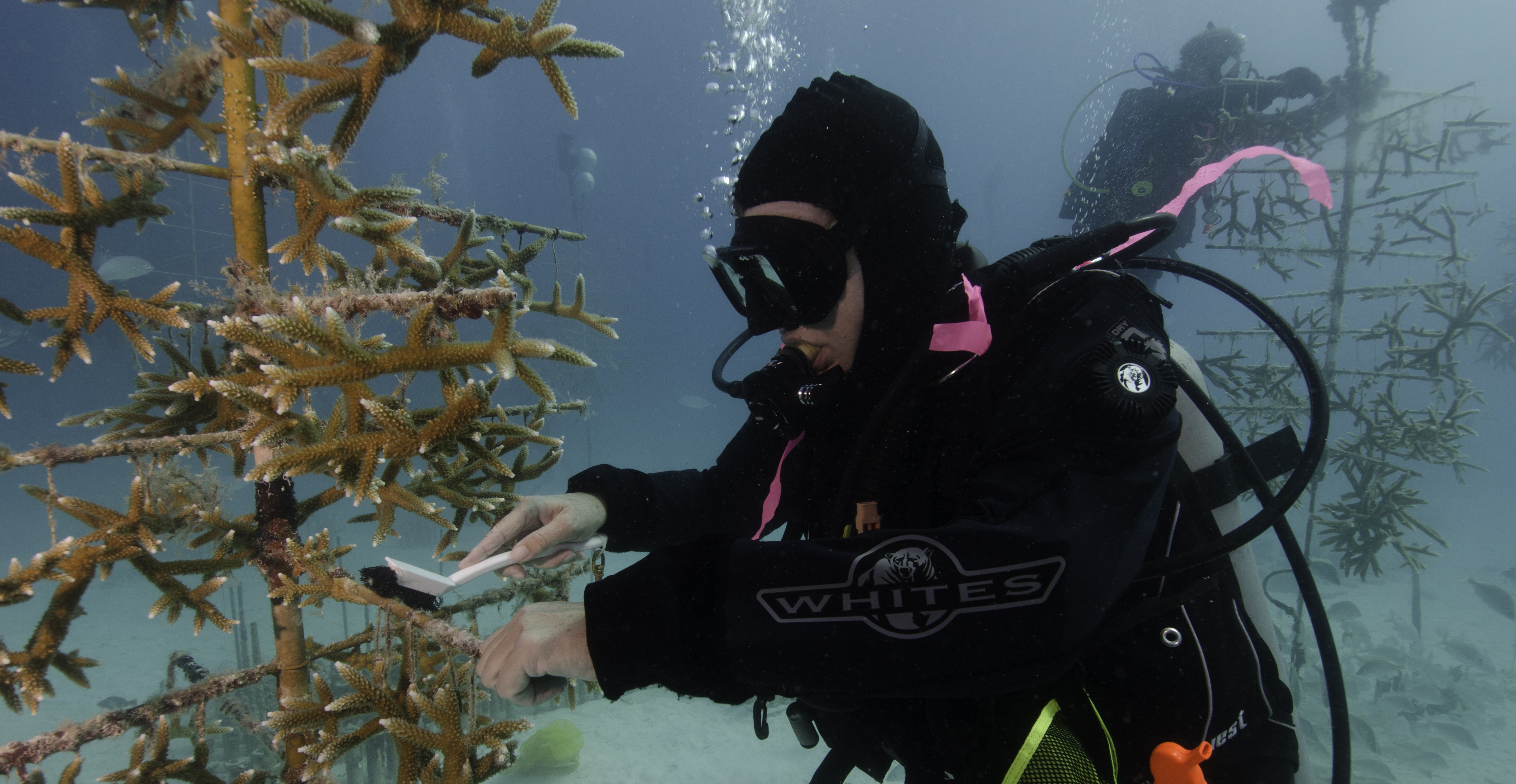
Dive experience and education fuel her passion for the sea and has made reef conservation a personal mission
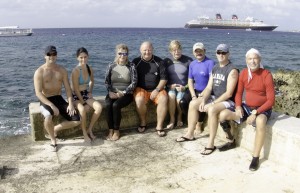 “I see dead coral – and in the back of my mind I’m saying, we can do something about this.”
“I see dead coral – and in the back of my mind I’m saying, we can do something about this.”
Lois Hatcher, who has been diving for more than 30 years and has seen the world’s oceans decline, IS doing something about it. She’s leading a hard-core group of volunteer divers in Grand Cayman who are working diligently to restore a large section of reef damaged by a cruise ship anchor in mid-September. They have been sifting through the rubble and dead coral, and salvaging pieces of live coral.
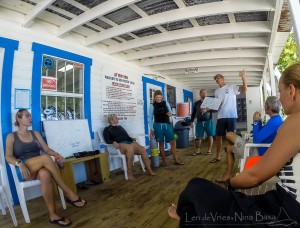 “If the pieces still have a little keyhole of light, the coral is still alive,” says Hatcher, who dives five days a week as the Photo Pro for Ocean Frontiers, and as project co-coordinator and a team leader, spends her days off at the recovery site. Lois and her team have already “out planted,” or reattached, about 15 pieces of live coral.
“If the pieces still have a little keyhole of light, the coral is still alive,” says Hatcher, who dives five days a week as the Photo Pro for Ocean Frontiers, and as project co-coordinator and a team leader, spends her days off at the recovery site. Lois and her team have already “out planted,” or reattached, about 15 pieces of live coral.
“We are trying to focus on the slow-growing corals and attaching them to open areas in the surrounding reef to give them a chance to keep growing. We are seeing signs of life and this gives us hope,” she says. “They are looking really, really good!”
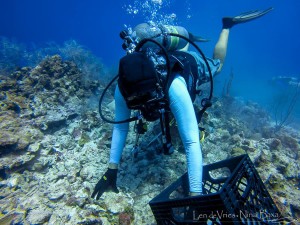
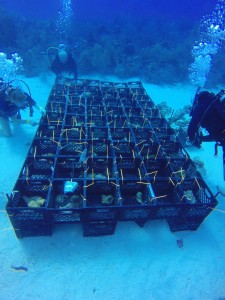 Lois Hatcher is using proven techniques that she has learned from some of the world’s leading experts in coral restoration; Dr. Alex Brylske, a renowned professor of Marine Environment Technology at Florida Keys Community College and Ken Nedimyer president of the Coral Restoration Foundation.
Lois Hatcher is using proven techniques that she has learned from some of the world’s leading experts in coral restoration; Dr. Alex Brylske, a renowned professor of Marine Environment Technology at Florida Keys Community College and Ken Nedimyer president of the Coral Restoration Foundation.
She was enrolled in Dr. Brylske’s first undergraduate course in coral restoration, and spent a year taking other marine science classes. Her former professor remembers an eager and enthusiastic student, so he’s not surprised by the role she has undertaken with the Magic Reef Restoration Project.
“I expected no less from Lois, even though it’s taken longer to happen than she had hoped,” he says. “Her goal was to do exactly what she seems to be doing—taking what she learned and applying it in other areas.”
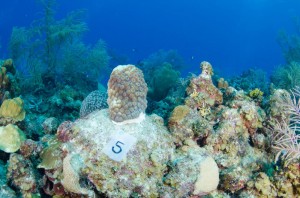 Ken Nedimyer says the restoration work is a start in the right direction. “Some people look at it as too little too late, but the little bit of progress being made is better than inaction. Like me, Lois has spent a lot of time underwater and has come to appreciate all the little creatures there, both big and small. She has seen first-hand the dramatic decline of coral reefs in the Caribbean, so she has sought out ways to help.”
Ken Nedimyer says the restoration work is a start in the right direction. “Some people look at it as too little too late, but the little bit of progress being made is better than inaction. Like me, Lois has spent a lot of time underwater and has come to appreciate all the little creatures there, both big and small. She has seen first-hand the dramatic decline of coral reefs in the Caribbean, so she has sought out ways to help.”
“Lois is a solid, dedicated team leader – the backbone of this project – and she knows her stuff when it comes to coral restoration,” say project co-coordinator Keith Sahm of Sunset House. “She has spent countless hours driving back and forth from East End, where she lives, to work on the damaged area every minute she has free. Lois intends to do whatever she can to see the coral reefs of Cayman get back to where they were!”
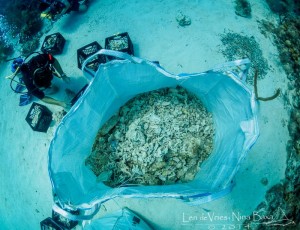 Sahm and Hatcher both say the biggest challenge to the restoration project, estimated to take a year to complete, is keeping up enthusiasm among the volunteer divers, whose numbers are dwindling as business picks up in advance of season. Both Dr. Alex Brylske and Ken Nedimyer have advice on that.
Sahm and Hatcher both say the biggest challenge to the restoration project, estimated to take a year to complete, is keeping up enthusiasm among the volunteer divers, whose numbers are dwindling as business picks up in advance of season. Both Dr. Alex Brylske and Ken Nedimyer have advice on that.
“In my experience there’s no need to keep volunteers motivated,” says Dr. Brylske. “Folks who do this are always willing to help. The only thing that can thwart enthusiasm is for projects to be hindered or halted by governmental interference or red tape. That’s the death knell to any project.”
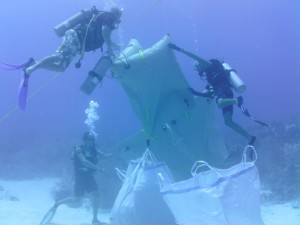 “Empowering recreational divers to help restore our coral reefs is an essential step in doing this on a scale big enough to make a difference,” adds Nedimyer. “Appreciation and recognition will go a long way.”
“Empowering recreational divers to help restore our coral reefs is an essential step in doing this on a scale big enough to make a difference,” adds Nedimyer. “Appreciation and recognition will go a long way.”
Sean Kingscote, a regular volunteer diver, says the team can count on him. “Volunteering is in my blood and have raised my children to understand that by giving back selflessly, it will be reward enough in the end. So until this reef is repaired I will be out as often as I can to help.”
The volunteers are already reaping the rewards of their work by witnessing life return to the damaged reef.
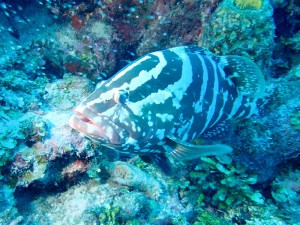 “Today I saw a decorator crab with big pieces of algae attached to its shell – and I hadn’t seen one in 20 years!” says an excited Lois Hatcher. “Now we have a friendly grouper that has moved in and it follows the divers around watching us work – we call it the ‘Supervisor.’ It reminds us that these creatures need a home so what we are doing is repairing their home.”
“Today I saw a decorator crab with big pieces of algae attached to its shell – and I hadn’t seen one in 20 years!” says an excited Lois Hatcher. “Now we have a friendly grouper that has moved in and it follows the divers around watching us work – we call it the ‘Supervisor.’ It reminds us that these creatures need a home so what we are doing is repairing their home.”
Ocean Frontiers co-founder Steve Broadbelt was well aware of Hatcher’s background and training when he hired her in 2012. He plans to establish a coral nursery at Ocean Frontiers, one of Grand Cayman’s most conservation minded companies.
“East End has the healthiest reefs on the island and we want to keep it this way by being prepared for environmental challenges that may come up,” says Broadbelt. “The nursery will be an on-going coral farm to help seed our reefs as needed to keep them healthy and thriving.”
During the past 20 years Hatcher has seen first hand the changes in Cayman’s reefs.
“The Elkhorn and Staghorn coral that used to be plentiful here are now hard to find,” she says. “We need to stop the loss of coral – if we save half of it, its still better than none and complete loss.”
Ken Nedimyer says the coral reefs of the world, and particularly the Caribbean, are in a very serious state of decline. Some are almost totally gone, so coral “gardening” is their last hope.
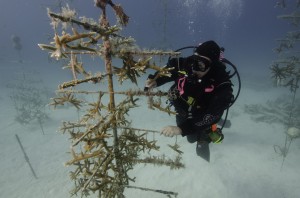
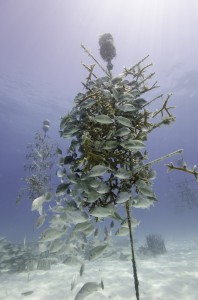 He says coral nurseries and coral gardens now exist in Fiji, Indonesia, Maldives, India, Israel, Egypt, Philippines, Japan and other places worldwide. In the Caribbean there are coral nurseries in the Bahamas, St Thomas, St Croix, British Virgin Islands, Puerto Rico, Dominican Republic, Jamaica, Belize, Bonaire, and Colombia. The Coral Restoration Foundation is planning to start nurseries in Jamaica, Curacao, Guadeloupe, the Grenadines, and Barbados during the next year.
He says coral nurseries and coral gardens now exist in Fiji, Indonesia, Maldives, India, Israel, Egypt, Philippines, Japan and other places worldwide. In the Caribbean there are coral nurseries in the Bahamas, St Thomas, St Croix, British Virgin Islands, Puerto Rico, Dominican Republic, Jamaica, Belize, Bonaire, and Colombia. The Coral Restoration Foundation is planning to start nurseries in Jamaica, Curacao, Guadeloupe, the Grenadines, and Barbados during the next year.
Lois Hatcher likes to remember a quote from one of her heroes, when she’s tired and thinking about the daunting task ahead them as they repair the coral reef.
“Oceanographer Sylvia Earle says ‘No Blue, No Green.’ If we don’t have the ocean, we don’t have us.”
About Ocean Frontiers and Compass Point Dive Resort
Ocean Frontiers Dive Shop is located at Compass Point Dive Resort on the remote East End of Grand Cayman. Founded in 1996 with one dive boat and a dream to introduce divers to the wonders of East End diving, the company has grown into one of Cayman’s premier dive operations with a reputation for catering to small groups and having the island’s friendliest staff. Ocean Frontiers is also recognized as one of the most conservation-minded dive operators in the Cayman Islands with a long history of promoting ocean protection through its company programs, and an unwavering support for outside environmental projects. The winner of Project AWARE’s Environmental Achievement Award in 2004 and 2010, Ocean Frontiers has again been recognized in 2012. The company also received the PADI Green Star Dive Center accreditation in 2012 for demonstrating a dedication to conservation, the first dive operator in the Cayman Islands to receive this distinction.
The Compass Point Dive Resort, which received the Green Globe Certification award in 2010 for sustainable tourism, is the epitome of laid-back luxury. It features 28 luxurious one, two and three bedroom oceanfront, ocean view and poolside condominiums, each with its own private patio or balcony and all beautifully decorated with stylish island décor, and fully equipped with all of the comforts of home. Eagle Ray’s Dive Bar and Grill is now open for business at the resort.
For more information:
Call Toll Free: 1 800-348-6096, Grand Cayman call (345) 640 7500
E-mail: info@oceanfrontiers.com, Website: www.oceanfrontiers.com.
Facebook.com/caymanscubadiving
LinkedIn: Ocean Frontiers
Gear News
Introducing the TR-80, IR-50 and CS-30 Regulators from DYNAMICNORD

Whether you are a beginner or a professional diver – with the three new main regulators from DYNAMICNORD, everyone will find their favourite regulator. They all look super stylish.
Excellent performance with the TR-80
Quality and performance are the be-all and end-all for regulators. It is not for nothing that the TR stands for Tec Reg. The innovative design of the TR-80 guarantees absolute reliability – even in ice-cold waters.

Perfect breathing effort at 0.8 J/l / certified for diving in waters below 10 degrees / structural design made of solid brass for best cold protection / membrane-compensated design with dry seal of the first stage / reduced exhalation effort thanks to optimized exhalation membrane and bubble deflector / adjustable Venturi (dive/predive) and adjustment knob for individual inhalation comfort / innovative design of the front cover prevents free-flow in strong currents or when diving with scooters / design made of sandblasted brass, matt chrome finish / 2 HP and 4 LP outlets / mouthpiece made of high-quality, anti-allergic silicone for maximum comfort.


Amazing underwater adventures with the IR-50
The IR-50 is the top regulator for advanced and experienced divers. Natural breathing is the essence of this regulator.

Ideal breathing effort at 0.8 J/l /certified for diving in waters below 10 degrees / compensated membrane / adjustable venturi (dive/predive) and adjustment knob for individual inhalation comfort/ outlet valve and deflector for minimum exhalation effort and reduction of bubbles on the face / design made of sandblasted brass, matt chrome finish / 2 HP and 4 NP outlets / mouthpiece made of high-quality, anti-allergic silicone for maximum comfort.


The Workhorse – our CS-30
For diving centres and diving beginners – the workhorse stands for strong construction, reliability and robustness. Perfect for your training.

Optimal breathing effort at 0.8 J/l /recommended for diving in waters above 10 degrees / non-compensated piston / adjustable venturi (dive/predive) / outlet valve and deflector for minimum exhalation effort and reduction of bubbles on the face / design made of sandblasted brass, matt chrome finish / 1 HP and 3 NP outlets / mouthpiece made of high-quality, anti-allergic silicone for maximum comfort.


Octopus OP-30
The OP-30 is the ideal addition to all DYNAMICNORD regulators. It is identical in construction to the CS-30.

The TR-80, IR-50, CS-30 (DIN & INT) regulators and the Octopus OP-30 are available from DYNAMICNORD dealers and in the online store.
DYNAMICNORD – Your Outdoor Companion.
Marine Life & Conservation
Paul Watson Released as Denmark Blocks Japan’s Extradition Bid

Renowned anti-whaling activist Paul Watson has been released from custody in Greenland after spending five months in detention. Denmark’s Justice Ministry rejected Japan’s request for his extradition, citing insufficient guarantees that his time already served in custody would be credited against any potential sentence.
The 74-year-old Canadian-American was arrested on July 21 in Nuuk, Greenland’s capital, when his ship docked to refuel. His arrest was based on a 2012 Japanese warrant related to a 2010 encounter in Antarctic waters. Japan alleged Watson obstructed operations and caused damage to a whaling research ship during efforts to disrupt illegal whaling. Watson has consistently denied these claims, maintaining his commitment to marine conservation.
Denmark, which oversees extradition matters for Greenland, concluded that while the legal conditions for extradition were met, the lack of assurances from Japan regarding time-served credit made extradition untenable.
In a video shared by his foundation, Watson expressed gratitude and relief, saying, “After five months, it’s good to be out… and good to know they’re not sending me to Japan.” He added that the most difficult part of his time in custody was being separated from his two young sons.
Watson is a pioneering figure in marine conservation, known for founding the Captain Paul Watson Foundation in 2022 after decades of activism with the Sea Shepherd Conservation Society. His bold efforts to defend marine life have earned him widespread support, including from celebrities and conservationists. His work has also been featured in the acclaimed reality TV series Whale Wars.
Watson’s lawyer, Jonas Christoffersen, praised the decision, stating, “We are happy and relieved that Paul Watson is now free.” He added that Watson is eager to reunite with his family and continue his vital work.
The arrest occurred while Watson’s vessel, the M/Y John Paul DeJoria, was en route to the North Pacific with a team of 26 volunteers to intercept a Japanese whaling ship. His foundation described the arrest as politically motivated and emphasized that Watson’s actions were focused on ending illegal whaling practices.
Japan resumed commercial whaling in 2019 after leaving the International Whaling Commission, asserting that whale meat is a cultural tradition. Conservationists, however, continue to challenge these practices, highlighting their impact on marine ecosystems.
Despite the challenges, Watson remains steadfast in his mission to protect marine life and bring attention to whaling practices. His dedication to ocean conservation has made him a globally respected advocate for the environment.
-

 News2 months ago
News2 months agoIconic SS United States to become the World’s Largest Artificial Reef
-

 News3 months ago
News3 months agoBook Review – 52 Assignments: Underwater Photography
-

 Gear News3 months ago
Gear News3 months agoDYNAMICNORD – New German diving brand enters the British market
-

 News3 months ago
News3 months agoExploring Cenote El Pit: A Diver’s Dream
-

 Gear News3 months ago
Gear News3 months agoTry BARE drysuits (and maybe even win one!) this Friday with Sea & Sea at North West Dive Fest
-

 Marine Life & Conservation3 months ago
Marine Life & Conservation3 months agoBook Review: Coral Triangle Cameos
-

 Blogs2 months ago
Blogs2 months agoDive the Egyptian Red Sea this Autumn with Regaldive
-

 News3 months ago
News3 months ago2024 Ocean Art Underwater Photo Competition Announced


